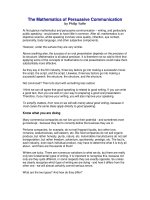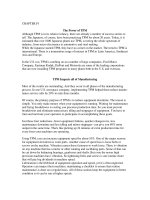Tài liệu The Secrets of Successful Networking ppt
Bạn đang xem bản rút gọn của tài liệu. Xem và tải ngay bản đầy đủ của tài liệu tại đây (85 KB, 2 trang )
The Secrets of Successful Networking
By Joan Reid
Looking for a job is a job in itself. We've all heard this. So those on a serious job quest polish their
resumes and dutifully distribute them around town. When I found myself in the job market last year, it was
the way I began. Then I discovered aggressive networking.
For many, the concept of networking conjures thoughts of calling up people they know and having lunch
or coffee with them and talking about opportunities that may exist in that person's company. Aggressive
networking carries this a step further.
First, make a list of people you know who have jobs in your line of work or related to your line of work.
Then sit down and call each person on your list and suggest that you meet for a coffee or something
equally brief. There are two reasons for this. One, you don't want to take up a lot of the other person's
time and two, lunches and dinners get to be expensive if you have many of them to buy.
Take networking seriously. That is, don't spread the meetings with your list of contacts out over a month-
long period. Start on a Monday morning and call everyone to book a get-together for later in the week or
at the latest, early next week.
When you have the meeting, keep it light. Don't show up with your resume and ask, "Do you know of any
jobs?" This is simply a reconnaissance mission. The person you're having coffee with is in the business
and knows what's happening. Ask for this information. Try saying something as simple and
straightforward as: "You're plugged into what's going on around town. Any suggestions on who I can talk
to about what might be coming up in the future?"
And here is the secret: Get three names from each contact. If I know the person really well, I out and out
asked for three names of contacts. If I didn't know the person that well, I listened and if they mentioned a
company, I asked something like: "Oh, XYZ Industries. Do you have any suggestions as to whom I could
speak to over there?"
By the end of the week, you may have a couple of dozen names of people in the industry. Sit down the
next Monday morning and call them. Introduce yourself, explain where you got their names and ask if you
can have 15 minutes of their time. Suggest meeting for a coffee near their office. Often, the person will
say something like, "Why don't you drop in around 3 p.m. We can talk here in my office."
Schedule your week, filling in time slots to meet people. And again, get three names from each of these
people. After a while, you may notice an overlapping of names as your contacts give you names of
people you have already contacted.
Don't ask for a job. Just the same as meeting with your acquaintances, keep it light. Say that you're
looking for a place in the industry and in the meantime, you're making an all-out effort to keep plugged
into what's happening.
Ascertain, if possible, what interests the people you meet. Keep a record of who you met and what their
interests are. This gives you a good opening for recontacting them if you see an article or hear about
something that might interest them. Keep in gentle contact with them.
You not only get your name spread around town so that when something does come up in your line of
work you hear about it, there are ancillary benefits to this kind of dedicated and aggressive networking.
You get to meet a wide variety of interesting people and your keep your working muscles intact by having
a specific task to do each week: meet more contacts.
Did it work for me? Yes. And in the best possible way. I'd worked in communications previously and as I
talked to more and more people, I began to have small contract jobs come my way. Something would
come up at an office and someone I contacted would remember me and give me call. (Yes, I left
business cards with everyone I met. Nothing fancy. My name, phone number and a line describing the
type of work I do). I didn't take a corporate job after all because I got so much contract work and
discovered that I not only like it better, I make more money at it. And the self-imposed discipline of
making contacts trained me to be my own boss.









